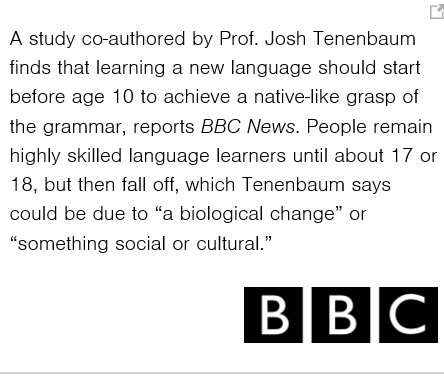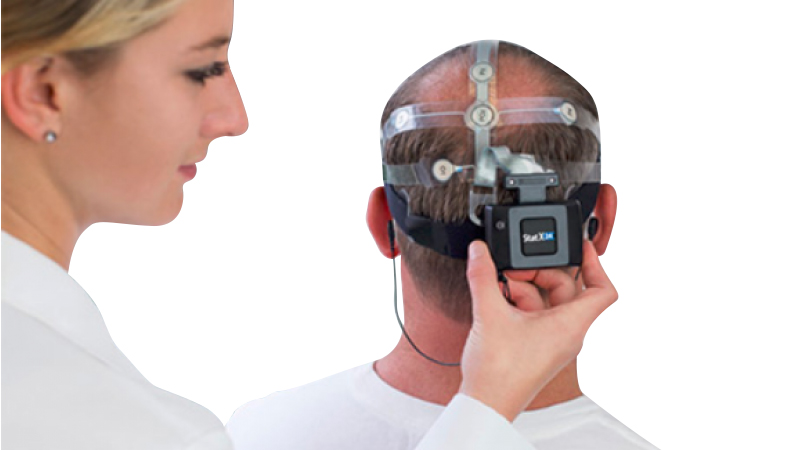915 阅读 2020-08-05 09:39:02 上传
以下文章来源于 Ling大连西路550号

很快引起了世界各大主流媒体的关注:


我们先来看看维基百科对关键期的定义:在发展心理学和发展生物学中,关键期是指一个生物体生命周期的成熟阶段,在这阶段中神经系统对某些环境刺激特别敏感。如果生物体在这一阶段没有得到适当的刺激去学习某种技能,那么日后很难再去成功地发展它。
语言学中有关键期假说(Critical Period Hypothesis)。1959年,神经生理学家Penfield和Roberts从大脑可塑性的角度,提出了10岁是学习语言的最佳年龄这一观点。哈佛大学心理学教授Eric Heinz Lenneberg(1967)则从医学临床经验出发,以神经生理学的观点系统地解释了语言学习关键期。他认为人的大脑从二岁开始边化(lateralization),在边化完成前,人是用全脑来学习语言,约在11-19岁左右,大脑会完成边化。而边化后的语言学习不如全脑学习时期来得好。因此,语言学习最好在大脑完成边化之前。语言学习的关键期到底持续多长时间还未有定论。
今年5月刊的Cognition杂志上,Joshua K. Hartshorne、Joshua B. Tenenbaum以及Steven Pinker发表的一篇名为『A critical period for second language acquisition: Evidence from 2/3 million English speakers』的论文(开头提到MIT所发布的新闻就是报导的这篇论文)中明确表示:语言学习的关键期持续到17.4岁。这一发现无疑是具有革命性意义的,将会深刻影响语言习得理论与实践,包括外语语言政策的制定与执行等等。
下面就让我们一起来看看新闻的具体内容以及发表在最新一期Cognition上的这篇论文的摘要。(附中英双语)

Steven Pinker
论文作者之一
著名认知心理学家
语言学家

MIT官网新闻译文▼
认知科学家定义了语言学习的关键期
研究表明十七八岁之前,儿童仍可以是熟练的语言学习者
Anne Trafton | 麻省理工新闻办公室
2018.5.1
大量的证据表明,相较于儿童来说,成年人学习一门新的语言难度更大。这使得科学家们提出了一个概念:语言学习的“关键期”。但是这个时期的长短及其根本原因仍是未知数。
麻省理工进行的一项新的研究表明,在17、8岁之前,儿童仍然十分擅长学习新语言的语法,这比原来预期的时间要长很多。然而,该研究还发现,除非人们在10岁之前就开始学习一门语言,否则他们几乎不可能达到和母语者类似的熟练程度。
波士顿学院的心理学助理教授Joshua Hartshorne说:“如果你想拥有和母语者一样水平的英语语法,那么就要在10岁前进行学习。出生就学和10岁之前学并没有什么差异,但10岁之后就能发现有明显的下降趋势。”他在MIT做博士后的时候进行了这项研究。
研究人员发现,人们在10至18岁之间学习语言的速度仍可以很快,但由于学习能力下降之前的窗口时间变得很短,他们并不会达到和母语者一样的熟练程度。这一发现是基于对近67万人所做语法测验的分析,这是迄今为止人们为了研究语言学习能力而搜集的最大数据集。
MIT大脑与认知科学教授,论文作者之一Josh Tenenbaum谈到:“直到现在,想要获得有关回答关键期持续多长时间这一问题的所有数据依然是非常困难的。我们可以研究一个古老的问题——很多智者都已对其进行了思考和记录,同时我们站在新的视角,去发现别人未曾发现之事。这是科学领域是很难得的机会。”
|快速学习者
虽然很明显儿童比成人学习语言更容易(这一现象经常在移民到新国家的家庭中出现),人们却很难在实验室环境中研究这一趋势。研究人员将成人和儿童领入实验室,教给他们有关语言的一些新要素,然后对其进行测试,发现在这些条件下成人的学习效果更好。Hartshorne说:“这样的研究可能无法准确复制长期的学习过程。无论结果是什么,在日常生活中,我们看到成年人在完全掌握语言的过程中遇到了困难,这发生在一个很长的时间尺度上。”
人们学习一门语言,费时又费力,所以研究人员提出了一种不同的方法:他们决定为成千上万的处在英语学习不同阶段的人们拍摄快照。通过测试不同年龄段人的语法能力——这些人在人生的不同时期开始学习英语,他们能够获得足够的数据从而得出有意义的结论。
Hartshorne最初估计他们至少需要50万名参与者,对这类研究来说,这种规模前所未有,同时招募工作也成为了一种挑战。于是Hartshorne着手想出一个足够有趣的语法测验来进行快速传播。
在一些MIT本科生的帮助之下,Hartshorne搜寻了关于语言学习的科学论文,从而找出非母语者最可能出错的语法规则。他写了一些能够揭示这些错误的问题,例如让学习者去判断类似Yesterday John wanted to won the race这样的句子语法是否正确。
为了吸引更多的人参加测试,他还出了一些对于语言学习测定非必要的问题,其目的是为了弄清测试者说的是哪种英语方言。例如:加拿大的英语说话者可能觉得I’m done dinner这句话是正确的,而其他人却不这么认为。
在Facebook上发布数小时之后,名为Which English的十分钟小测试就已经大范围传播开来了。
Hartshorne说:“接下来的几个星期我们一直在保持网站运行,因为获得的流量非常大。由此我也知道了这个实验足够有趣。”
|漫长的关键期
参加测验后,用户被要求透露他们现在的以及开始学习英语的年龄,还有其他相关的语言背景信息。研究人员最终获得了669498个人的完整数据,一旦他们掌握了如此庞大的数据就必须要知道如何去分析。
Hartshorne说:“我们必须要梳理清楚以下问题:人们学习这种语言多少年了;是什么时候开始说这种语言的;他们得到了何种接触;他们是在课堂中学习,还是移民到了英语国家。”
研究人员开发并测试了各种计算模型,从而观察哪一种与他们的结果最为一致。最后发现对他们数据的最佳解释是:在17或18岁之前保持着很强的语法学习能力,然后就会下降。研究结果表明,学习语言的关键期比认知科学家以前认为的要长得多。
“这让我们感到惊讶。”Hartshorne说,“争论的焦点是,它是否从出生开始下降,还是在5岁开始下降,又或者从青春期开始下降。”
作者指出,成年人仍擅长学习外语,但如果他们在青少年或成人时期开始学习则无法达到母语水平。
“尽管人们早已观察到尽早学习二语会比较容易,但这项研究提供了迄今为止最有说服力的证据,即人生中有特定的学习时间,过后学习新语言语法的能力就会下降。”加州大学伯克利分校心理学助理教授Mahesh Srinivasan(他并未参与这项研究)表示,“这是该领域迈出的重要一步。这项研究还揭示了令人惊讶的新问题,因为它表明了关键期比以前想象的要晚得多。”
导致关键期在18岁左右结束的原因尚不清楚。研究人员认为文化因素可能会发挥作用,也有可能是这个年龄段出现了大脑可塑性的变化。
“有可能是生理变化,也可能是社交或文化方面的作用。”Tenenbaum说,“在很多社会中,大约有一段从未成年人走向17或18岁的时期。之后,你离开家,也许全职工作,也许成为一名大学生。所有这些都会影响你学习语言的速度。”
Hartshorne现在计划在波士顿学院的实验室里进行一些相关研究,其中包括比较西班牙语母语和非母语者。他还计划研究语法的各个方面是否具有不同的关键期,以及语言技能的其他因素(如口音)是否具有较短的关键期。
研究人员还希望其他科学家能利用他们发布在网上的数据进行更多的研究。
“人们可以分析这些数据的其他方面。”Hartshorne说,“我们确实希望能够吸引其他科学家的注意力,因为数据就在那里而且可以使用。”
这项研究由美国国立卫生研究院和MIT“心智、大脑和机器中心”资助。

英文原版▼
A great deal of evidence suggests that it is more difficult to learn a new language as an adult than as a child, which has led scientists to propose that there is a “critical period” for language learning. However, the length of this period and its underlying causes remain unknown.
A new study performed at MIT suggests that children remain very skilled at learning the grammar of a new language much longer than expected — up to the age of 17 or 18. However, the study also found that it is nearly impossible for people to achieve proficiency similar to that of a native speaker unless they start learning a language by the age of 10.
“If you want to have native-like knowledge of English grammar you should start by about 10 years old. We don’t see very much difference between people who start at birth and people who start at 10, but we start seeing a decline after that,” says Joshua Hartshorne, an assistant professor of psychology at Boston College, who conducted this study as a postdoc at MIT.
People who start learning a language between 10 and 18 will still learn quickly, but since they have a shorter window before their learning ability declines, they do not achieve the proficiency of native speakers, the researchers found. The findings are based on an analysis of a grammar quiz taken by nearly 670,000 people, which is by far the largest dataset that anyone has assembled for a study of language-learning ability.
“It’s been very difficult until now to get all the data you would need to answer this question of how long the critical period lasts,” says Josh Tenenbaum, an MIT professor of brain and cognitive sciences and an author of the paper. “This is one of those rare opportunities in science where we could work on a question that is very old, that many smart people have thought about and written about, and take a new perspective and see something that maybe other people haven’t.”
Steven Pinker, a professor of psychology at Harvard University, is also an author of the paper, which appears in the journal Cognition on May 1.
Quick learners
While it’s typical for children to pick up languages more easily than adults — a phenomenon often seen in families that immigrate to a new country — this trend has been difficult to study in a laboratory setting. Researchers who brought adults and children into a lab, taught them some new elements of language, and then tested them, found that adults were actually better at learning under those conditions. Such studies likely do not accurately replicate the process of long-term learning, Hartshorne says.
“Whatever it is that results in what we see in day-to-day life with adults having difficulty in fully acquiring the language, it happens over a really long timescale,” he says.
Following people as they learn a language over many years is difficult and time-consuming, so the researchers came up with a different approach. They decided to take snapshots of hundreds of thousands of people who were in different stages of learning English. By measuring the grammatical ability of many people of different ages, who started learning English at different points in their life, they could get enough data to come to some meaningful conclusions.
Hartshorne’s original estimate was that they needed at least half a million participants — unprecedented for this type of study. Faced with the challenge of attracting so many test subjects, he set out to create a grammar quiz that would be entertaining enough to go viral.
With the help of some MIT undergraduates, Hartshorne scoured scientific papers on language learning to discover the grammatical rules most likely to trip up a non-native speaker. He wrote questions that would reveal these errors, such as determining whether a sentence such as “Yesterday John wanted to won the race” is grammatically correct.
To entice more people to take the test, he also included questions that were not necessary for measuring language learning, but were designed to reveal which dialect of English the test-taker speaks. For example, an English speaker from Canada might find the sentence “I’m done dinner” correct, while most others would not.
Within hours after being posted on Facebook, the 10-minute quiz “Which English?” had gone viral.
“The next few weeks were spent keeping the website running, because the amount of traffic we were getting was just overwhelming,” Hartshorne says. “That’s how I knew the experiment was sufficiently fun.”
A long critical period
After taking the quiz, users were asked to reveal their current age and the age at which they began learning English, as well as other information about their language background. The researchers ended up with complete data for 669,498 people, and once they had this huge amount of data, they had to figure out how to analyze it.
“We had to tease apart how many years has someone been studying this language, when they started speaking it, and what kind of exposure have they been getting: Were they learning in a class or were they immigrants to an English-speaking country?” Hartshorne says.
The researchers developed and tested a variety of computational models to see which was most consistent with their results, and found that the best explanation for their data is that grammar-learning ability remains strong until age 17 or 18, at which point it drops. The findings suggest that the critical period for learning language is much longer than cognitive scientists had previously thought.
“It was surprising to us,” Hartshorne says. “The debate had been over whether it declines from birth, starts declining at 5 years old, or starts declining starting at puberty.”
The authors note that adults are still good at learning foreign languages, but they will not be able to reach the level of a native speaker if they begin learning as a teenager or as an adult.
"Although it has long been observed that learning a second language is easier early in life, this study provides the most compelling evidence to date that there is a specific time in life after which the ability to learn the grammar of a new language declines," says Mahesh Srinivasan, an assistant professor of psychology at the University of California at Berkeley, who was not involved in the study. “This is a major step forward for the field. The study also opens surprising, new questions, because it suggests that the critical period closes much later than previously thought."
Still unknown is what causes the critical period to end around age 18. The researchers suggest that cultural factors may play a role, but there may also be changes in brain plasticity that occur around that age.
“It’s possible that there’s a biological change. It’s also possible that it’s something social or cultural,” Tenenbaum says. “There’s roughly a period of being a minor that goes up to about age 17 or 18 in many societies. After that, you leave your home, maybe you work full time, or you become a specialized university student. All of those might impact your learning rate for any language.”
Hartshorne now plans to run some related studies in his lab at Boston College, including one that will compare native and non-native speakers of Spanish. He also plans to study whether individual aspects of grammar have different critical periods, and whether other elements of language skill such as accent have a shorter critical period.
The researchers also hope that other scientists will make use of their data, which they have posted online, for additional studies.
“There are lots of other things going on in this data that somebody could analyze,” Hartshorne says. “We do want to draw other scientists’ attention to the fact that the data is out there and they can use it.”
The research was funded by the National Institutes of Health and MIT’s Center for Minds, Brains, and Machines.

Cognition论文摘要译文▼
A critical period for second language acquisition: Evidence from 2/3 million English speakers
二语习得的关键期:67万英语说话者的证据
Joshua K. Hartshorne[a,b]
Joshua B. Tenenbaum[a]
Steven Pinker[c]
a :Department of Brain & Cognitive Sciences, Massachusetts Institute of Technology, Building 46, 77 Massachusetts Avenue, MIT, Cambridge, MA 02139, United States
B: Department of Psychology, Boston College, McGuinn Hall 527, Chestnut Hill, MA 02467, United States
c :Department of Psychology, Harvard University, William James Hall 970, 33 Kirkland St., Cambridge, MA 02138, United States
儿童学习语言比成人更容易,尽管这种能力何时以及为何下降于实证(研究动力不足)和概念(衡量从不同年龄开始的学习者的最终习得状态本身不能揭示潜在学习能力的变化)原因层面都是模糊的。我们用空前规模的数据集(669498名非英语母语者)和一个计算模型(该模型通过理清当前年龄、初次接触的年龄和学习经验的年数来估计潜在学习能力的轨迹)来解除这两方面的限制。这使得我们能够首次直接评估语法学习能力是如何随着年龄而变化的,结果发现它几乎延续到了成年的关键时期(17.4岁),然后稳步下降。这一发现不仅适用于“困难”的句法现象,而且适用于通常在早期习得的“简单”的句法现象。这一结果表明,语言习得中有一段明确的关键期,而且结束的时间比原来推测的要晚得多。数据集的规模也为语言习得中其他几个悬而未决的问题提供了新的见解。











